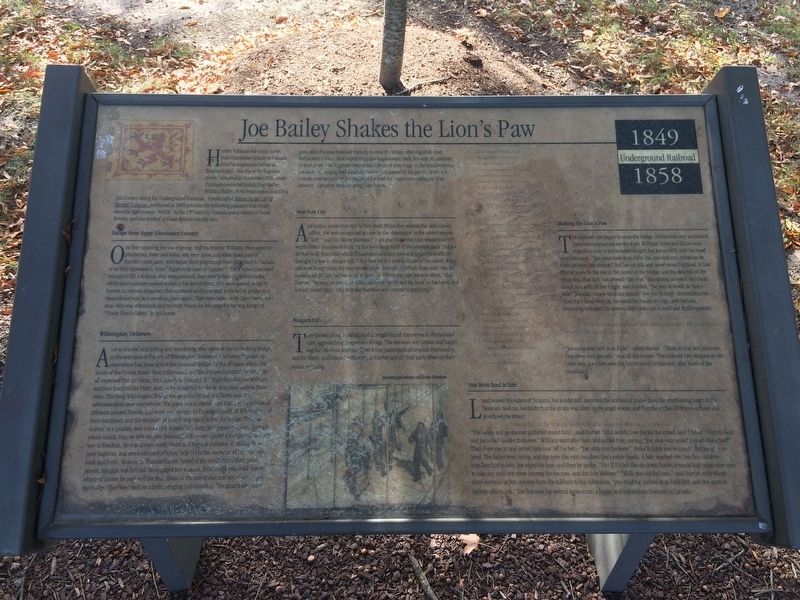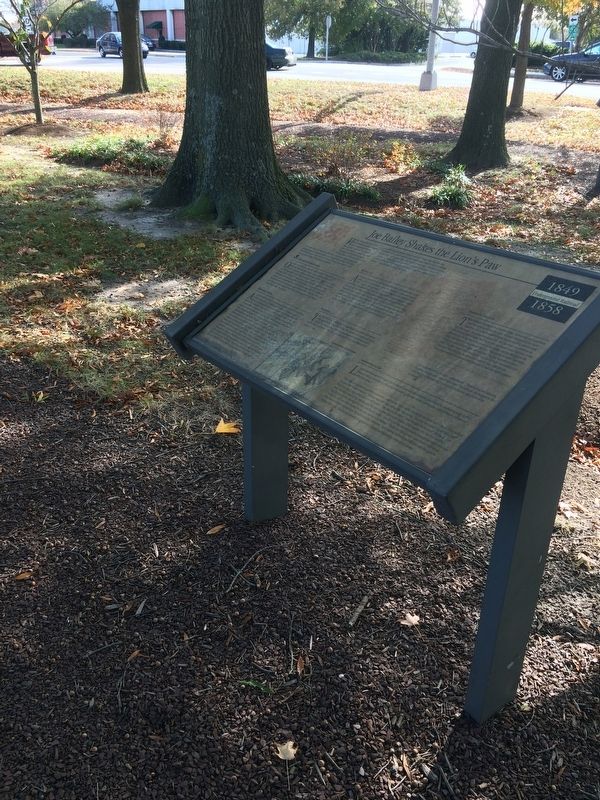Cambridge in Dorchester County, Maryland — The American Northeast (Mid-Atlantic)
Joe Bailey Shakes the Lion's Paw
Underground Railroad
— 1849 - 1858 —

Photographed By Devry Becker Jones (CC0), November 11, 2017
1. Joe Bailey Shakes the Lion's Pak Marker
Harriet Tubman led many slaves from Dorchester County to Canada (via the suspension bridge at Niagara Falls). One trip with "fugitive slaves" occurred in November 1856, when Tubman conducted Josia (Joe) Bailey, William Bailey, Peter Pennington and Eliza [Ma]nokey along the Underground Railroad. A book called Scenes in the Life of Harriet Tubman, published in 1869 provides the following passages that vividly describe the journey. NOTE: In the 19th century, Canada was a colony of Great Britain, and the symbol of Great Britain was the lion.
Escape from Egypt (Dorchester County)
One fine morning, Joe was missing, and his brother William; from another plantation, Peter and Eliza, too were gone, and these made part of Harriet's next party, who began their pilgrimage from Maryland to Canada, or as they expressed it, from "Egypt to de land of Canaan." Their adventures were enough to fill a volume; they were pursued; they were hidden in potato holes, while their pursuers passed within a few feet of them; they were passed along by friends in various disguises; they scattered and separated, to be led by guides in a roundabout way, to a meeting place again. they were taken in by Sam Green, the man who was afterwards sent to State Prison for ten years for having a copy of "Uncle Tom's Cabin" in his house.
Wilmington, Delaware
And so hunted and hiding and wandering, they came at last to the long bridge at the entrance of the city of Wilmington, Delaware. The reward posted up everywhere had been at first five hundred dollars for Joe. If taken within the limits of the United States: then a thousand, and then fifteen hundred dollars, "an' all expenses clar an' clean, for his body in Easton Jail." Eight hundred for William, and four hundred for Peter, and twelve thousand for the woman who enticed them away. The long Wilmington Bridge was guarded by police officers, and the advertisements were everywhere. The party was scattered and taken to the houses of different colored friends, and word sent secretly to Thomas Garrett, of Wilmington, of their condition and the necessity of their being taken across the bridge. Thomas Garrett is a Quaker and a man of a wonderfully large and generous heart through whose hands, Harriet tells me, two thousand self-emancipated slaves passed on their way to freedom. He was always ready, heart and hand and means in aiding the poor fugitives, and rendered most efficient help to Harriet on many of her journeys back and forth. As soon as Thomas Garrett heard of the condition of these poor people, his plan was formed. He engaged two wagons, filled them with brick layers, whom of course he paid well for their share in the enterprise and sent them over the bridge.

Photographed By Devry Becker Jones (CC0), November 11, 2017
2. Joe Bailey Shakes the Lion's Pak Marker
New York City
And so they made their way to New York. When they entered the anti-slavery office, Joe was recognized at once by the description in the advertisement. "Well," said Mr. Oliver Johnson, "I am glad to see the man whose head is worth fifteen hundred dollars." At this Joe's heart sank. If the advertisement had got to New York, that place which it had taken so many days and nights to reach, he thought he was in danger still. "And how far is it now to Canada?" he asked. When told how many miles, for they were to come through New York State and cross the Suspension Bridge, he was ready to give up. "From dat time Joe was silent," said Harriet; "he sang no more, he talked no more; he sat wid his head on his hand, and nobody could 'muse him or make him take any interest in anything."
Niagara Falls
They passed along in safety, and at length found themselves in the railroad cars, approaching Suspension Bridge. The rest were very joyous and happy, but Joe sat silent and sad. Their fellow passengers all seemed interested in and for them, and listened with tears as Harriet and all their party lifted up their voices and sang.
Shaking the Lion's Paw
The railroad cars began to cross the bridge. Harriet was very anxious to have her companions see the Falls. William, Peter and Eliza came eagerly to look at the wonderful sight; but Joe sat still, with his head upon his hand. "Joe come look at de Falls! Joe you fool you, come see de Falls! It's your last chance." But Joe sat still and never raised his head. At last Harriet knew by the rise in the center of the bridge, and the descent on the other side, that they had crossed "the line." She sprang acrsoss to Joe's seat, shook him with all her might, and shouted, "Joe you've shood de lion's paw!" Joe didn't know what she meant. "Joe you're free!" shouted Harriet. Then Joe's head went up, he raised his hands on high, and his face, streaming with tears to heaven, and broke out in loud and thrilling tones:
"Joe come and look at de Falls!" called Harriet. "Glory to God and Jesus too, One more soul got safe," was all the answer. The railroad cars stopped on the other side. Joe's feet were the first to touch British soil, after those of the conductor.
One More Soul is Safe
Loud roared the waters of Niagara, but louder still ascended the anthem of praise from the overflowing heart of the freeman. And can we doubt that the strain was taken up by angel voices, and that the arches of Heaven echoed and re-echoed the strain:
"The ladies and gentlemen gathered round him," said Harriet "till I couldn't see Joe for the crowd, only I heard 'Glory to God and Jesus too!' louder than ever." William went after him, and pulled him, saying "Joe stop your noise! You act like a fool!" Then Peter ran in and jerked him mos' off his feet,--"Joe, stop your hollerin'! Folks'll think you're crazy!" But Joe gave no heed. The ladies were crying, and the tears like rain ran down Joe's sable cheeks. A lady reached over her fine cambric handkerchief to him. Joe wiped his face, and then he spoke, "Oh! If I'd felt like did down South, it would hab taken nine men to take me; only one more journey for me now, and dat is to Hebben!" "Well, you old fool you," said Harriet, with whom there seems to be but one step from the sublime to the ridiculous, "you might a' looked at de Falls first, and den gone to Hebben afterwards." She has seen Joe several times since, a happy and industrious freeman in Canada.
Topics and series. This historical marker is listed in these topic lists: Abolition & Underground RR • African Americans • Women. In addition, it is included in the Harriet Tubman Underground Railroad Byway series list. A significant historical year for this entry is 1856.
Location. This marker has been replaced by another marker nearby. It was located near 38° 33.572′ N, 76° 3.783′ W. Marker was in Cambridge, Maryland, in Dorchester County. Marker was at the intersection of Washington Street (Maryland Route 343) and Ocean Gateway (U.S. 50), on the right when traveling east on Washington Street. Touch for map. Marker was at or near this postal address: 4 Washington Street, Cambridge MD 21613, United States of America. Touch for directions.
Other nearby markers. At least 8 other markers are within walking distance of this location. Born To Be Free (a few steps from this marker); Harriet Tubman Memorial Garden (within shouting distance of this marker); Agents on the Underground Railroad (within shouting distance of this marker); Abolitionist, Scout, Spy, and Nurse (within shouting distance of this marker); Goldsborough Stable (approx. half a mile away); Turning Numbers into Names… (approx. half a mile away); Neild Museum (approx. half a mile away); Annie Oakley Lived Down The Street (approx. half a mile away). Touch for a list and map of all markers in Cambridge.
Also see . . . Harriet Tubman: American hero. Dorchester website entry (Submitted on May 6, 2023, by Larry Gertner of New York, New York.)
Credits. This page was last revised on May 6, 2023. It was originally submitted on November 11, 2017, by Devry Becker Jones of Washington, District of Columbia. This page has been viewed 904 times since then and 142 times this year. Photos: 1, 2. submitted on November 11, 2017, by Devry Becker Jones of Washington, District of Columbia. • Bill Pfingsten was the editor who published this page.